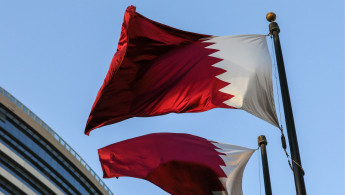Qatar to host indirect Iran-US talks on nuclear deal, confirms official
Iran has confirmed that indirect talks with world powers over its nuclear programme will be moved to Qatar from the Austrian capital.
"Iran chose Qatar as a place for negotiations as it is a friendly country," Iranian media adviser Mohammad Marandi told Al-Araby Al-Jadeed, The New Arab’s sister site.
The confirmation comes after reports had said Iran would choose a Gulf state – either Qatar or Oman – to resume indirect talks with US.
Qatar is a strong US ally and has long shared good ties with neighbouring Iran.
Marandi stressed to Al-Araby Al-Jadeed that the resumption of talks did not mean that a deal was close, adding that any agreement depended on "lifting sanctions and providing guarantees to Iran," issues on which the Americans "have not yet taken a necessary decision."
The Iranian spokesperson said Tehran needed to make sure Washington could not easily repeat its "previous behaviour," as "the Americans have permanently violated the nuclear agreement and adopted a policy of maximum pressure."
In March, the pact appeared close to being secured when the EU - which is coordinating negotiations - invited foreign ministers representing the accord's parties to Vienna to finalise an agreement after 11 months of indirect talks between Tehran and President Joe Biden's administration.
But the talks have since been suspended, chiefly over Tehran's insistence that Washington remove the Islamic Revolutionary Guard Corps (IRGC) - its elite security force - from the US Foreign Terrorist Organization list.
The EU's foreign policy chief Josep Borrell, who travelled to Iran last week, said on Saturday that the indirect talks were expected to resume in the coming days in a Gulf country to overcome the standstill.
While a source briefed on the visit said that "US Special Envoy for Iran, Robert Malley, is expected to arrive in Doha on Monday and will meet with the Qatari foreign minister," an Iranian official told Reuters that Iran's chief nuclear negotiator Ali "Bagheri Kani will be in Doha for the talks on June 28 and 29".
Last week, one Iranian and one European official told Reuters that Iran had dropped its demand for the removal of the IRGC's FTO sanctions, but still two issues, including one on sanctions, remained to be resolved.
Is Israel widening its shadow war against Iran?
— The New Arab (@The_NewArab) June 2, 2022
✍ @James_P_Snellhttps://t.co/ROWPslVIMj
"Nothing is agreed until everything is agreed," Iran's Foreign Ministry spokesman Saeed Khatibzadeh said on Monday.
"We will see if an agreement can be reached in the coming weeks ... Iran's nuclear steps are reversible if Washington fulfils its commitments."
The 2015 nuclear pact imposed restrictions on Iran's nuclear activities in exchange for the lifting of international sanctions. Then-President Donald Trump pulled the US out of the deal in 2018, reimposing crippling economic sanctions on Tehran.
Iran's clerical establishment responded by breaching the pact's nuclear restrictions, including a 3.67% cap on the purity to which it could purify uranium and a 202.8-kg limit on its enriched uranium stock.
(Reuters, Al-Araby Al-Jadeed)





 Follow the Middle East's top stories in English at The New Arab on Google News
Follow the Middle East's top stories in English at The New Arab on Google News


